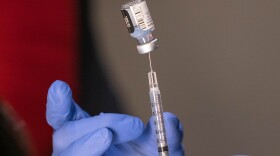From Nov. 22 to Nov. 28, the Yukon-Kuskokwim Health Corporation reported 175 new COVID-19 cases in the region. YKHC also reported two new hospitalizations in-region, and one death due to the virus during this one week period.
This is a significant drop in reported cases for the Y-K Delta. Cases are down 29% from last week, with 73 fewer cases reported. Last week there were 248 new cases, two hospitalizations in-region, and two deaths. Case rates have not been this low since late August. The test positivity rate for the entire Y-K Delta also fell 3%, suggesting that fewer COVID-19 cases are going unreported.
Currently, the Y-K Delta’s COVID-19 case rate is almost four times higher than the national case rate and two times higher than the state’s. After ranking fourth last week, the Bethel Census Area is no longer on the New York Times national list of the 50 highest case rates by county. However, the region is still identified as having the worst outbreak in the United States over the course of the pandemic by the publication.
From Nov. 22 to Nov. 28, YKHC announced an average of 25 new COVID-19 cases each day, 10 fewer cases per day than the week before. Over the same seven day period, the Alaska Department of Health and Social Services announced 1,163 new COVID-19 cases statewide. During that time, the Y-K Delta made up 15% of the state’s new cases.
Over the past week, in alphabetical order by community, YKHC announced five cases in Akiachak, two in Akiak, 21 in Alakanuk, 1 in Atmautluak, 36 in Bethel, 14 in Eek, 13 in Emmonak, one in Hooper Bay, seven in Kasigluk, two in Kongiganak, nine in Kwigillingok, five in Napaskiak, 21 in Nunapitchuk, three in Pilot Station, two in Quinhagak, one in Scammon Bay, 20 in Toksook Bay, and 10 in Tuluksak.
How does the Yukon-Kuskokwim Delta compare to state and national trends?
As of Friday, Nov. 26, YKHC reports that 15,040 unique individuals have been completely immunized against COVID-19; this is about 55% of the total population.
According to state data, the Yukon-Kuskokwim Delta has a higher vaccination rate than both the state and nation. Regionally, 67% of the eligible population is fully vaccinated, compared to 55% of the eligible population statewide. The Centers for Disease Control and Prevention (CDC) reports that nationally, 62.8% of the eligible population is fully vaccinated.
Case rates have fallen significantly in the region, but per capita, the Yukon-Kuskokwim Delta is still outpacing the state and the nation. Per 100,000 people in the region, about 603.4 developed COVID-19 in the last seven days. In the same time period, the state announced 268.6 new cases per 100,000 people across Alaska, and the CDC announced 156 cases per 100,000 people across the U.S.
Since January 2021, the Y-K Delta’s case trends have followed Alaska state trends, experiencing spikes in cases and subsequent drops in cases about one to two weeks after the peaks or valleys reported by the state. With the exception of a four-week period from early April to mid-May 2021 and one week in September, regional cases have been consistently and significantly higher than the state’s.
As the holiday season approaches and people begin to travel and gather with extended friends and family, COVID-19 cases are expected to rise. Emergence of the omicron variant, which the World Health Organization (WHO) labeled a “variant of concern” on Friday, Nov. 26, also poses a high risk globally.
Dr. Anthony Fauci encouraged Americans to prepare for the “inevitable” emergence of the variant in the United States in an interview with ABC’s “This Week.” Local, state, and national health experts recommend getting vaccinated as the most effective way to protect yourself from infection.








